
This news has been coming for the last few days: Lashio has fallen to the Japanese. As the Daily Express reports, the town was ‘pounded by artillery and dive-bombers before the final assault’ (1):
Then large numbers of tanks and armoured cars rumbled forward into the inferno as a battering ram for the enemy.
General Stillwell’s defending [Chinese] army was overwhelmed by the superior numbers and weight of metal in the Jap attack.
A spokesman for Marshal Chiang Kai-shek did little to disguise the seriousness of the situation, saying that ‘the Chinese will be be compelled to abandon positional warfare and resort to mobile war’ in Burma. He continued:
The enemy columns now at Lashio and Hsipaw could continue to advance northwards, cutting off first the Chinese forces in Burma from China, and, secondly, Chinese land communications with India by way of upper Burma, or they could turn westward with the aim of encircling the Chinese now fighting on the Mandalay and Irrawaddy fronts.
He paid tribute to the ‘outnumbered’ British forces defending Burma, saying they have ‘heroically held out, winning the praise and admiration of their Allies’.
The East Anglian town raided on Wednesday night is now identified as Norwich (Manchester Guardian, 6):
Many shops were demolished and houses in several areas were destroyed or damaged. There were many casualties, and large numbers of people have joined the hundreds rendered homeless two nights before. In some cases raiders flew along roads of villas dropping high explosives and incendiaries. Several churches suffered from blast or fire. Two were totally destroyed.
Seven people were killed when two surface shelters ‘received direct hits’, and ‘Three members of a family were rescued after three hours’ digging; only one survived’. The Daily Mirror‘s headline about the Norwich raid reads:
Pyjama-clad girls fight ‘Baedeker’ fire bombs
These girls tried to defend the school at which they boarded (the name of which is not given), though ultimately unsuccessfully:
‘There was no panic among the girls,’ an official said. ‘They put out several fires on the top floor and even tried to tackle incendiaries on the roof. We couldn’t stop them. Only when the flames were beyond control did the girls go to their shelter trenches.’
There has been criticism from York of the BBC’s announcement (repeated in the press yesterday) ‘that York Minster had not been damaged in Tuesday night’s raid’ (Daily Express, 3). The Lord Mayor of York, Mrs A. Crichton — who has complained via telegram to Minister of Information Brendan Bracken — said yesterday:
I have received dozens of letters from citizens who think the information almost amounted to an invitation to bomb the Minster, especially after their avowed intention of attacking places of historical interest.
The Dean of York, the Very Rev. E. Milner-White, was milder, saying only that the announcement was ‘an indiscretion’. The Yorkshire Post, while sympathetic, thinks these complaints are misguided (2):
To say that the Minster escaped damage would not convey anything to the enemy that he could not find out for himself […] German airmen can take photographs just as ours can, and Germans can get information about York just as we can get information about Cologne. Nothing would be gained by making a mystery of whether the Minster had been hit or not.
The leading article ends by imagining ‘that the Germans said not a word in public about Rostock and Luebeck‘, and asking:
What influence would that silence have on our plans? None whatsoever.
The Air Ministry has released statistics refuting ‘German propaganda designed to show that the Luftwaffe is able to maintain simultaneously a heavy attack on Britain, Malta, and Russia’ (The Times, 2). Just considering the period from the first raid on Exeter to the one on York (i.e. from the night of 23 April to the night of 29 April), the total number of German aircraft employed totalled 150, and never more than 50 in one night. The total tonnage of bombs dropped by the Luftwaffe on Britain in this period was around 225. Moreover,
During the same six nights the R.A.F. dropped on Germany alone over 1,300 tons — as great a tonnage a night as the total tonnage dropped by the enemy on the four British cities in six nights.
Bomber Command’s latest raid is on the Gnome-Rhône aero engine factory and the adjoining Goodrich tyre factory at Gennevilliers, ‘a few miles to the north-west of Paris’ (The Times, 4). For some reason this doesn’t receive the same measure of attention as a raid on Rostock, say, does — The Times gives it about half a column but very much buries the story, the section headline speaking only of ‘SEVEN BIG R.A.F. SWEEPS OVER 400-MILE FRONT’ and ‘TARGETS ATTACKED FROM BRITTANY TO FLUSHING’. Similarly, a story that ‘The big British air raids on Trondheim, in Norway have caused a mass exodus from the city’ is given only two sentences in the Guardian (6).
Today’s Zec (Mirror, 3) appears to be suggesting that Hitler, having committed ‘MORE RESERVES FOR RUSSIA’ for the forthcoming offensive, should keep in mind the ‘POSSIBILITY OF A SECOND FRONT’ to the west in this, ‘The month of May-be!’ Maybe. The Yorkshire Post‘s military correspondent says that ‘To-day brings the first important month of the summer operations’ in Russia, and wonders who will strike first? (1)
It may be Russia, as the Nazis have had to make drastic changes of plan at an hour when all should have been ready.
Waiting has cost Hitler the first round, as the R.A.F. has begun the British offensive, which demands the formation of a new German front in the West, and is the best kind of aid for Stalin.
Following ‘the German Army’s winter defeat’, the Russians have acted offensively ‘while still holding back the summer armies’, causing the Germans ‘to use summer troops prematurely and lose certain strategic positions’. The German positions in the north and centre now seem unfavourable for an advance.
In the South the Germans have a large group of armies destined to strike for the Caucasus. They have been deprived of a secondary route through the Crimea. From Kharkov to Taganrog the Russians have many wedges in the enemy’s forward positions.
The stakes, of course, are extremely high, not just for the outcome of the war itself but for the fate of the people living under German rule. A note by Molotov, the People’s Commissar for Foreign Affairs, outlining ‘Nazi barbarities’ has been published in London (Guardian, 8). One extract from the Guardian‘s summary:
In two Ukrainian towns, Gadyach and Zenkovo, in the Poltava region, 280 citizens were dumped into a pit after having been tortured to death, and the Nazis then threw the living children of the victims into the pit.
Could it still happen here? A Basingstoke schoolmaster and Home Guard lieutenant, F. B. Baker, has written a play portraying a German invasion of Britain. It is called ‘Storm Troopers Over Perivale’ and Ernest Betts of the Express says it is ‘a play of urgency, speed and courage’ (3). Baker wrote it because he is ‘worried about Britain’s preparedness for invasion’:
‘They don’t know there’s a war on down here,’ Mr. Baker said. ‘I wrote my play in a fortnight after school hours, to show them.’
The setting is a Hampshire farmhouse, with ‘the whole of England keyed up to invasion, church bells ringing, the guns going off’. The prime minister is heard broadcasting a defiant speech to the nation when he is forced off the air by German paratroops.
The play shows what would happen to you if the Germans were here. A German major tortures Englishwomen, strikes them brutally in the face.
Arrogant Huns become Gauleiters of English counties and pour scorn on the helplessness of the British Army, but in the end black-faced Home Guards (made up like Commandos) throw out the Germans in a joint scheme with the Army.
‘This is the final battle,’ says the Prime Minister in his broadcast. ‘If we fall, the world will return to barbarism… all of us in this island would be better dead.’
Baker is staging the production himself at the Queen Mary’s School ‘at a cost of £20, with Home Guards, factory workers, farmers and schoolboys in the cast’. Only time will tell whether Betts is correct in his assessment that ‘Storm Troopers Over Perivale’ ‘may well prove to be the “Journey’s End” of this war’.
![]() This work is licensed under a Creative Commons Attribution-NonCommercial-NoDerivatives 4.0 International License.
Permissions beyond the scope of this license may be available at http://airminded.org/copyright/.
This work is licensed under a Creative Commons Attribution-NonCommercial-NoDerivatives 4.0 International License.
Permissions beyond the scope of this license may be available at http://airminded.org/copyright/.


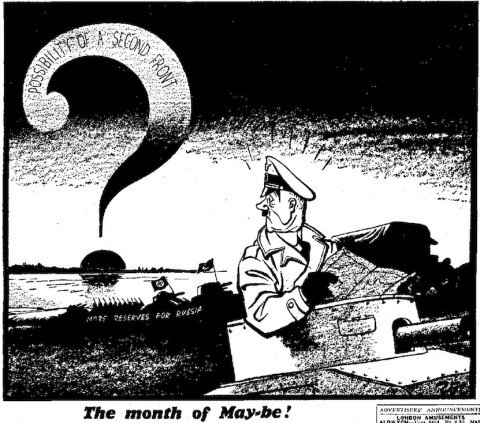
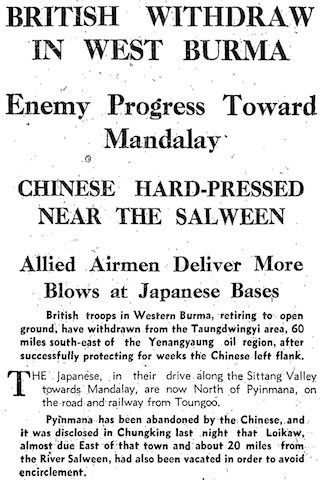
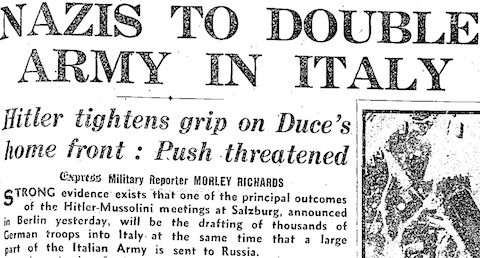
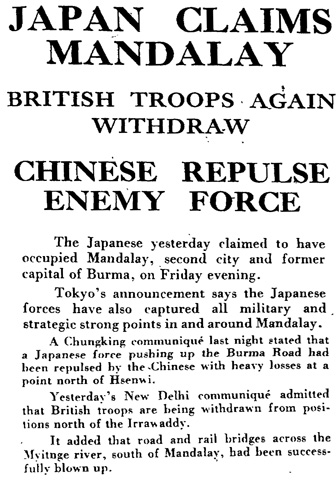
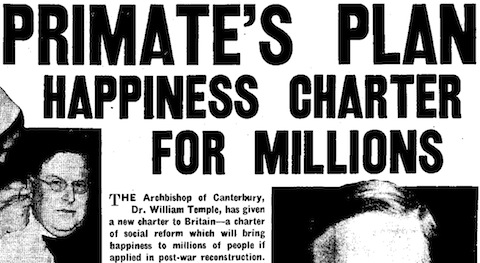
Pingback: Airminded · Saturday, 2 May 1942
Pingback: Airminded · Monday, 4 May 1942
Pingback: Airminded · Post-blogging the Baedeker Blitz: conclusion